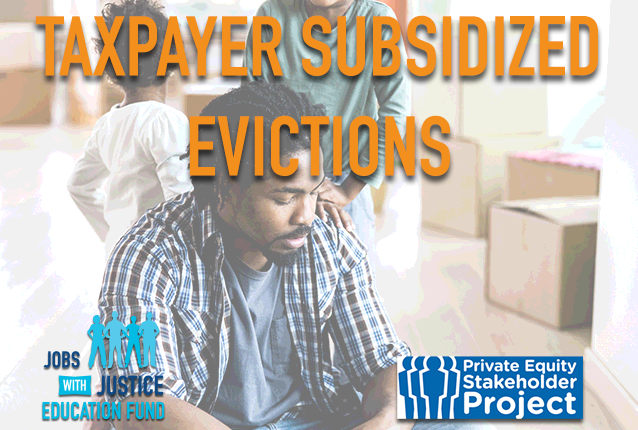Corporate Landlords Pocket Federal Sweetheart Deals, Subsidies and Tax Breaks While Evicting Struggling Families
Corporate landlords aggressively pursued COVID-related government assistance, with at least 197 of them garnering $320 million in federal COVID subsidies. These 197 subsidy-rich corporate landlords collectively filed at least 5,381 evictions between March 16th and October 13th. Corporate landlords leading in evictions and receiving federal assistance include: Ventron Management (1,017 evictions filed; $3.5 million in PPP grants), Madera Residential (352; $3.5 million in PPP grants), Mid-America Apartment Communities (252; $1,105,368 in Federal Reserve loan purchases), Camden Property Trust (158; $1,107,021 in Fed loan purchases) and Asia Capital Real Estate Management (156; $250,000 in PPP grants).
- Nine million Americans were behind on their rent in November, according to the U.S. Census Bureau. The $320 million of COVID subsidies handed out to corporate landlords would have been enough to cover 219,550 months of rent at the nation’s median rent ($1,463). The corporate landlord COVID stimulus subsidies would have been enough to pay the nine months of rent (since the pandemic started) for 24,394 families. However, despite receiving millions of taxpayer dollars, these corporate landlords are evicting tenants in the middle of a global pandemic despite the advice from public health experts urging people to stay in their homes.
Furthermore, this federal COVID relief for businesses is not the only way that corporate landlords have pocketed public dollars, subsidies and tax breaks while driving up rents and exacerbating the housing crisis.
- In 2012, the federal government launched a pilot program that incentivized Wall Street investors to easily buy foreclosed homes held by the government’s mortgage financing agencies.
- Government-owned Fannie Mae guaranteed $1 billion of Blackstone Group’s loans used to acquire 50,000 homes for its Invitation Homes business.
- Between 2011 and 2017, hedge funds, private equity firms and other deep-pocketed investors snatched up more than 200,000 homes, paying $36 billion.
- These large corporate landlords are more likely than smaller landlords to evict their tenants, according to a study by the Federal Reserve Board of Atlanta.
Overly generous tax giveaways to the real estate industry are important, not simply because they exempt corporate landlords from paying for the public services their businesses rely upon, but because some of them create incentives that further harm working families who are their tenants.
- The ability to avoid capital gains taxes by selling properties has resulted in a steady stream of property swaps between corporate landlords. These tax maneuvers mean that tenants regularly experience management and policy changes among property owners.
- Provisions that grant additional tax-reducing depreciation deductions on appreciating properties increase the incentive to aggressively increase rents and evict tenants who can’t pay, moves which also increases the property values.
Corporate landlords forcefully argue that cancelling rent is not possible and the debts of those driven to the financial edge by COVID must be paid. Yet corporate landlords like Blackstone and Starwood Capital have failed to pay hundreds of millions of their own mortgage-backed security debt for their commercial real estate holdings.
At the end of December, new COVID-19 relief legislation extended the Centers for Disease Control comprehensive federal eviction moratorium through the end of January 2021, extended unemployment benefits with added $300 per week emergency payments through March, and provided $25 billion in emergency rent relief targeted for lower-income families and to be administered by the states. While these measures will help, they merely push a mounting crisis down the road. To prevent this housing catastrophe:
- We call on the federal government to permanently extend eviction and foreclosure moratoriums, to cancel rent, and to require greater transparency of the race, ethnicity, gender and age of tenants that landlords seek to evict.
- If the federal government fails to permanently protect tenants, we call upon states and cities, to extend their own COVID-19 eviction and foreclosure moratoriums, as they did during the early days of the pandemic.
- We call upon corporate landlords, those who have benefited immensely from a variety of public assistance and favorable tax laws, to suspend eviction filings irrespective of federal moratoriums, establish policies for rent cancellation, and to adopt policies designed to prevent implicit bias in eviction filings by gathering and reporting on demographic data for those they file evictions against.

